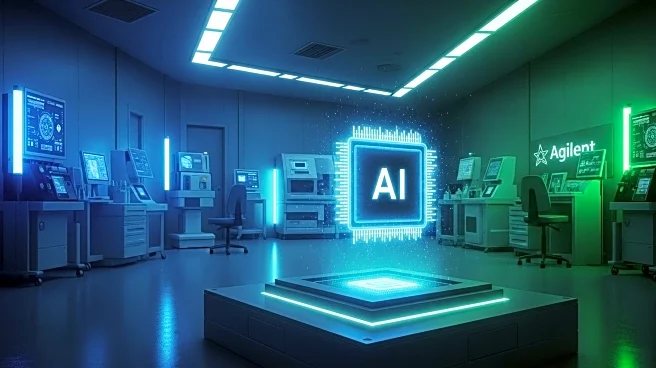What's Happening?
Lunit, a company specializing in AI for cancer diagnostics, has partnered with Agilent Technologies Inc., a leader in life sciences, to develop AI-based companion diagnostic solutions. This collaboration aims to enhance the precision of biomarker testing by combining Lunit's AI technology with Agilent's expertise in tissue-based diagnostics. The partnership will focus on creating advanced solutions for novel and complex biomarker assays in drug development. The initial phase will involve co-developing AI-powered assays for use in research and clinical trials, which will improve the accuracy of diagnosis and therapeutic efficacy measurement. This initiative is expected to support pharmaceutical companies in developing companion diagnostic products, ultimately benefiting patients by providing more tailored treatment options.
Why It's Important?
The collaboration between Lunit and Agilent is significant as it addresses the current challenges in precision oncology, where biomarker testing is largely dependent on manual interpretation. By integrating AI technology, the partnership aims to accelerate the development and market introduction of biomarker-driven therapies, ensuring patients receive appropriate treatments more efficiently. This advancement in diagnostic technology could lead to more personalized healthcare solutions, potentially improving patient outcomes and reducing healthcare costs. Pharmaceutical companies stand to gain from faster and more reliable diagnostic tools, enhancing their ability to develop targeted therapies.
What's Next?
The partnership is expected to lead to the development of advanced AI-powered diagnostic solutions that meet the demands of complex biomarker assays. As these solutions are integrated into clinical trials and research, pharmaceutical companies may begin to adopt these technologies more widely, potentially leading to a shift in how biomarker testing is conducted. The success of this collaboration could encourage further partnerships between AI and life sciences companies, driving innovation in the field of precision medicine.
Beyond the Headlines
The integration of AI in clinical trial design and diagnostics raises ethical and regulatory considerations, particularly regarding data privacy and the accuracy of AI algorithms. As AI becomes more prevalent in healthcare, there will be a need for robust frameworks to ensure the responsible use of technology. Additionally, the collaboration highlights the growing trend of interdisciplinary partnerships in healthcare, which could lead to more holistic approaches to patient care.










